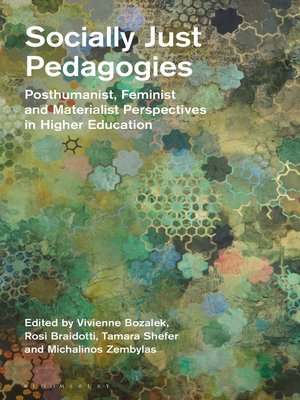Socially Just Pedagogies
ebook ∣ Posthumanist, Feminist and Materialist Perspectives in Higher Education
By Rosi Braidotti

Sign up to save your library
With an OverDrive account, you can save your favorite libraries for at-a-glance information about availability. Find out more about OverDrive accounts.
Find this title in Libby, the library reading app by OverDrive.



Search for a digital library with this title
Title found at these libraries:
| Loading... |
This book addresses contemporary philosophical issues in higher education and how we can create socially just pedagogies and a socially just university. Providing a forum for thinking through how critical posthumanism, affect theory and feminist new materialisms provide a useful lens for higher education, and shows how these standpoints can benefit methods and practices of learning and teaching.
Gross inequalities in higher education continue to affect pedagogical practices across geopolitical contexts and there is a need to consider new theories which call into question the commonplace humanist assumptions currently dominating the discourse around social justice in this context. However scholarship on the affective turn, critical posthumanism and new material feminisms, opens both new possibilities and responsibilities for higher education pedagogies. The approaches of this book also provide imaginative ways of engaging with current dissatisfactions with higher education, from the marketization of education, to issues of racism, discrimination and lack of diversity.
Of international relevance, this collection particularly foreground southern contexts and case studies, such as the student activism in South African universities that has sparked a global project of decolonization and social justice in educational institutions. This book is an urgent call to reconceptualize, rethink and reconfigure pedagogies in higher education and the implications for future citizenship and social participation.
Gross inequalities in higher education continue to affect pedagogical practices across geopolitical contexts and there is a need to consider new theories which call into question the commonplace humanist assumptions currently dominating the discourse around social justice in this context. However scholarship on the affective turn, critical posthumanism and new material feminisms, opens both new possibilities and responsibilities for higher education pedagogies. The approaches of this book also provide imaginative ways of engaging with current dissatisfactions with higher education, from the marketization of education, to issues of racism, discrimination and lack of diversity.
Of international relevance, this collection particularly foreground southern contexts and case studies, such as the student activism in South African universities that has sparked a global project of decolonization and social justice in educational institutions. This book is an urgent call to reconceptualize, rethink and reconfigure pedagogies in higher education and the implications for future citizenship and social participation.






